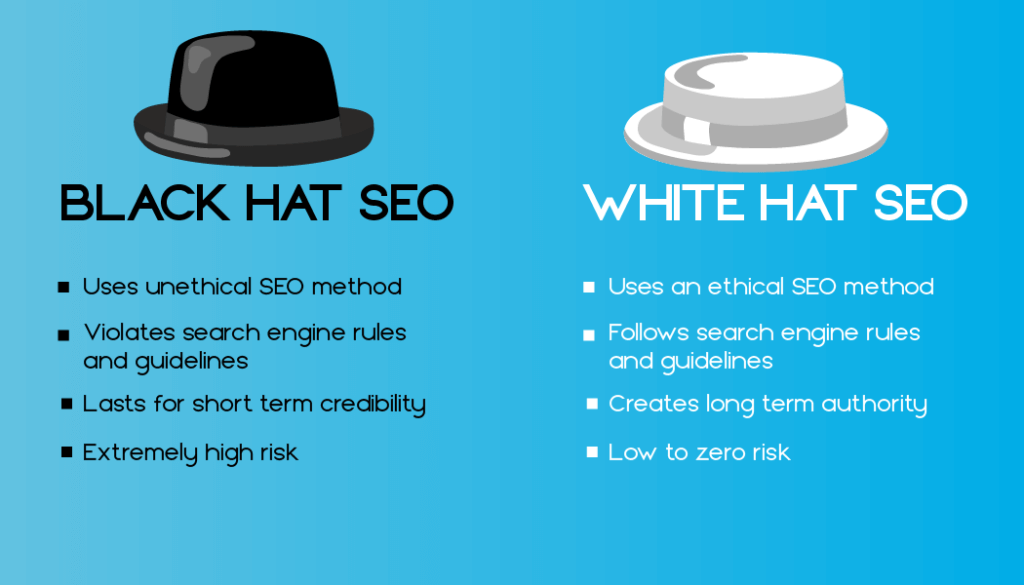In the ever-evolving world of search engine optimization (SEO), the debate between White Hat and Black Hat practices remains a hot topic. White Hat SEO encompasses ethical techniques that prioritize user experience and comply with search engine guidelines, while Black Hat SEO adopts aggressive tactics to manipulate rankings, often disregarding rules and guidelines set by search engines.
In this article, we will explore the key differences between these two approaches and shed light on why ethical practices are crucial for achieving sustainable, long-term success in the digital landscape.
The Fundamental Differences:
White Hat SEO focuses on creating valuable, relevant, and user-friendly content. It emphasizes the importance of optimizing website elements, such as meta tags, headings, and alt text, to make it easier for search engines to understand the content’s context. Additionally, White Hat SEO prioritizes building high-quality backlinks through organic outreach and link earning, as opposed to resorting to dubious link-building schemes.
On the other hand, Black Hat SEO employs tactics that aim to deceive search engines, often resulting in quick but short-lived rankings gains. Techniques such as keyword stuffing, hidden text, and cloaking are common practices in Black Hat SEO. These methods may lead to temporary improvements in rankings, but search engines are continuously refining their algorithms to detect and penalize such manipulative tactics.
The Importance of Ethical SEO:
- Sustainable Rankings: One of the primary reasons to adopt ethical SEO practices is the longevity of rankings. White Hat strategies may take longer to show results, but they are more likely to withstand algorithm updates and ensure your website maintains its position in search results over time.
- User Trust and Credibility: Building a reputable online presence is essential for any business or website. Ethical SEO fosters trust and credibility among users, as they know they can rely on your content to be valuable and relevant. In contrast, Black Hat practices can tarnish your brand’s reputation, leading to a loss of user trust and potential customers.
- Avoiding Penalties: Search engines are getting better at identifying and penalizing websites that engage in Black Hat SEO. These penalties can range from decreased rankings to complete removal from search results. Recovering from such penalties can be time-consuming and costly, making ethical practices a wiser choice.
- Long-Term Relationships: Ethical SEO involves building genuine relationships with users, customers, and other websites in your industry. These relationships can lead to valuable partnerships, guest posting opportunities, and natural backlinks, all of which contribute to long-term success.
White Hat Strategies for Long-Term Success:
- Quality Content Creation: Invest in creating valuable and relevant content that satisfies user intent and answers their queries. High-quality content is more likely to attract organic backlinks and shares, boosting your website’s authority.
- Keyword Research and Optimization: Conduct thorough keyword research to identify relevant and low-competition keywords. Incorporate them naturally into your content to enhance its visibility in search results.
- On-Page Optimization: Pay attention to on-page elements such as title tags, meta descriptions, heading tags, and alt attributes. Optimizing these elements makes it easier for search engines to understand your content.
- Link Building through Outreach: Build genuine relationships with influencers, industry leaders, and authoritative websites. Outreach to them for guest posting opportunities or collaborations can lead to valuable backlinks.
- Website Performance and User Experience: Ensure your website is fast, mobile-friendly, and user-friendly. A positive user experience contributes to higher engagement and increased chances of attracting return visitors.
Conclusion:
In the battle between White Hat and Black Hat SEO, the significance of ethical practices cannot be overstated. While Black Hat techniques might promise quick gains, they pose serious risks to your online presence and brand reputation. In contrast, White Hat SEO, despite requiring more time and effort, ensures sustainable rankings, user trust, and long-term success.
Adopting ethical SEO practices, such as creating valuable content, optimizing on-page elements, and building natural backlinks, not only improves your website’s visibility in search results but also establishes your credibility and authority in your industry. In the end, the decision to prioritize ethical SEO is a commitment to a solid foundation that will stand the test of time and contribute to the growth and success of your business in the digital world.
